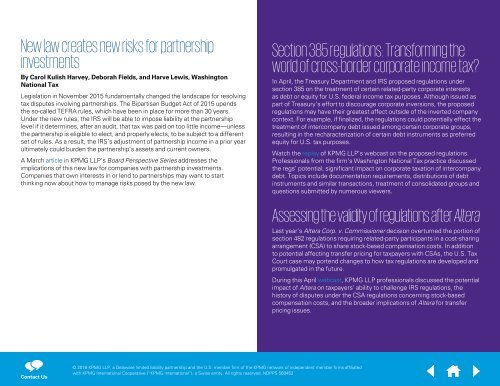Tax Dispute Resolution Quarterly
29rgRWs
29rgRWs
Create successful ePaper yourself
Turn your PDF publications into a flip-book with our unique Google optimized e-Paper software.
New law creates new risks for partnership<br />
investments<br />
By Carol Kulish Harvey, Deborah Fields, and Harve Lewis, Washington<br />
National <strong>Tax</strong><br />
Legislation in November 2015 fundamentally changed the landscape for resolving<br />
tax disputes involving partnerships. The Bipartisan Budget Act of 2015 upends<br />
the so-called TEFRA rules, which have been in place for more than 30 years.<br />
Under the new rules, the IRS will be able to impose liability at the partnership<br />
level if it determines, after an audit, that tax was paid on too little income—unless<br />
the partnership is eligible to elect, and properly elects, to be subject to a different<br />
set of rules. As a result, the IRS’s adjustment of partnership income in a prior year<br />
ultimately could burden the partnership’s assets and current owners.<br />
A March article in KPMG LLP’s Board Perspective Series addresses the<br />
implications of this new law for companies with partnership investments.<br />
Companies that own interests in or lend to partnerships may want to start<br />
thinking now about how to manage risks posed by the new law.<br />
Section 385 regulations: Transforming the<br />
world of cross-border corporate income tax?<br />
In April, the Treasury Department and IRS proposed regulations under<br />
section 385 on the treatment of certain related-party corporate interests<br />
as debt or equity for U.S. federal income tax purposes. Although issued as<br />
part of Treasury’s effort to discourage corporate inversions, the proposed<br />
regulations may have their greatest affect outside of the inverted company<br />
context. For example, if finalized, the regulations could potentially effect the<br />
treatment of intercompany debt issued among certain corporate groups,<br />
resulting in the recharacterization of certain debt instruments as preferred<br />
equity for U.S. tax purposes.<br />
Watch the replay of KPMG LLP’s webcast on the proposed regulations.<br />
Professionals from the firm’s Washington National <strong>Tax</strong> practice discussed<br />
the regs’ potential, significant impact on corporate taxation of intercompany<br />
debt. Topics include documentation requirements, distributions of debt<br />
instruments and similar transactions, treatment of consolidated groups and<br />
questions submitted by numerous viewers.<br />
Assessing the validity of regulations after Altera<br />
Last year’s Altera Corp. v. Commissioner decision overturned the portion of<br />
section 482 regulations requiring related-party participants in a cost-sharing<br />
arrangement (CSA) to share stock-based compensation costs. In addition<br />
to potential affecting transfer pricing for taxpayers with CSAs, the U.S. <strong>Tax</strong><br />
Court case may portend changes to how tax regulations are developed and<br />
promulgated in the future.<br />
During this April webcast, KPMG LLP professionals discussed the potential<br />
impact of Altera on taxpayers’ ability to challenge IRS regulations, the<br />
history of disputes under the CSA regulations concerning stock-based<br />
compensation costs, and the broader implications of Altera for transfer<br />
pricing issues.<br />
© 2016 KPMG LLP, a Delaware limited liability partnership and the U.S. member firm of the KPMG network of independent member firms affiliated<br />
with KPMG International Cooperative (“KPMG International”), a Swiss entity. All rights reserved. NDPPS 568452


